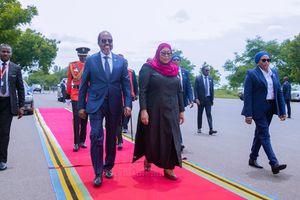Seeds as the genesis: Transforming edible oil industry in Tanzania

What you need to know:
- These interventions are all aimed at facilitating rapid, systemic and large-scale changes in the sunflower value chain which, in the end, targets to reverse the edible oil deficit and sustain its industry.
By Hamis Adam
Dar es Salaam. Sunflower is one of Tanzania’s major import substitution crops alongside sugar and wheat.
The crop and its value chain are the bedrock of the country’s edible oil industry, with its current national demand at just over half a million tonnes. Country’s production is hardly 300,000 tonnes, necessitating an import tag of 350,000 tonnes.
This constrains Tanzania heavily in terms of flight of much needed forex earnings.
Recently, while tabling the Sh751 billion Ministry of Agriculture budget for the coming 2022-2023 fiscal year, Mr Hussein Bashe, the minister, and his deputy Anthony Mavunde proposed various solutions to the Tanzanian edible oil conundrum.
Among them is the immediate focus on producing about 1.4 million tonnes of sunflower grains to allow processors to produce about 400,000 tonnes of sunflower oil.
Quite a good and straight forward plan on paper. However, there is one huge problem – a systemic constraint of lack of quality sunflower seeds.
This is evidenced from sector-wide assessment of the crop’s value chain by the Agricultural Markets Development Trust (AMDT). This Tanzanian development organisation is a facilitative partner and collaborator to the Ministry of Agriculture towards various strategic interventions and in particular in the initiative of seed breeding, multiplication and commercialisation.
These interventions are all aimed at facilitating rapid, systemic and large-scale changes in the sunflower value chain which, in the end, targets to reverse the edible oil deficit and sustain its industry.
Addressing the systemic constraint of lack of quality sunflower seeds
How big is the lack of quality sunflower seeds problem for Tanzania?
The best way to answer this is by looking backwards at the current edible oil deficit.
While launching the Agenda 10/30 at the Jakaya Kikwete Convention Centre in Dodoma, in April, a month or so before the Budget Sessions in Parliament, among other things, Minister Bashe pledged to his boss--President Samia Suluhu Hassan--his ministry’s broad ambition to enable Tanzania to produce 400,000 tonnes of edible oil to counter the current deficit.
The minister proposed that, in order to produce that amount of sunflower oil, Tanzania would need an extra 1.4 million tonnes of sunflower grains, from an extra 2.8 million acres of sunflower fields. This will be a massive increase from the current output of just below a million tonnes of sunflower annually. Now the crunch – that additional production will need additional injection of 6,000 tonnes of quality sunflower seeds that currently the country does not have. A quick reminder, Tanzania imports most of its high-quality sunflower seeds, mainly from India and South Africa.
It is for this reason that AMDT resorted to investing heavily in developing local capacity of sunflower seeds research, breeding, and commercialisation. For this, AMDT has partnered with the Ministry of Agriculture, through its Tanzania Agricultural Research Institute (Tari) facility in Ilonga, Morogoro, as the lead agency.
Tari is the biggest agricultural research institution in the country, with world-class facilities and centres for various crops spread across Tanzanian regions. This public institution fits the bill as the best lead agency for this strategic intervention.
The business model of this strategic intervention focuses on Public Private Partnerships (PPP) towards research, production and distribution of improved sunflower seeds to farmers in producing regions in Tanzania. Tari Ilonga works with private sector seed companies, namely Biosustain in Singida, Aminata in Tanga and Highland Seed Growers of Mbeya to pilot innovative large-scale production and distribution of quality sunflower seeds.
In this project, the research outfit and the three private seeds producers in four regions aim to produce up to 300 tonnes of quality sunflower seeds for the next season.
“Our studies evidenced that we cannot sort out the edible oil challenge in Tanzania without first, and very strategically, attacking the lack of quality sunflower seeds. This is probably the biggest and very much systemic constraint in our sunflower value chain right now. Our research-based evidence also informs us that the quickest and possibly most feasible route to take is public private collaboration in the breeding and commercialization of seeds supply,” says Athumani Zuberi, the Monitoring and Result Measurement manager at AMDT.
He adds that through partnership with the Ministry of Agriculture, both the public and private sector actors are made to meet midway through AMDT facilitation. “Each of these players brings a key input to the consortium. The Ministry of Agriculture coordinates overall seed policy direction for country, and so the Ministry-AMDT partnership is strategic and aims at inclusive seed system growth. On the other hand, Tari through its Ilonga research facility, undertakes demand-driven seed breeding program, while the three large scale agriculture investors in Singida, Tanga, Morogoro and Mbeya regions are responsible for the large-scale production and distribution of the improved seeds to smallholders. This include raising awareness to the farmers on the efficacy of improved seeds” adds Mr Zuberi.
Lack of access, availability and affordability of improved sunflower seeds inhibits increased production and productivity by sunflower farmers, particularly thousands of smallholder farmers who represent the largest portion of Tanzanian sunflower producers. As a result, this limit increased and sustained incomes, which if fully earned would improve their livelihoods. This challenge further results into low yields, low oil content sunflower grains, poor quality and processing industries operating below capacities.
The largest setback of all this is the amount of forex the country uses annually to import crude edible oil, mostly palm oil from countries in Asia. AMDT believes that working in partnership for growth with key stakeholders such as the Government of Tanzania through the Ministry of Agriculture and the Ministry of Investment, Industry and Trade and other likeminded organisations can easily reverse the deficit and achieve positive strategic headways for the country.
Hamis Adam is a Senior Strategic Communications Officer at Agricultural Markets Development Trust (AMDT). Email: [email protected].




